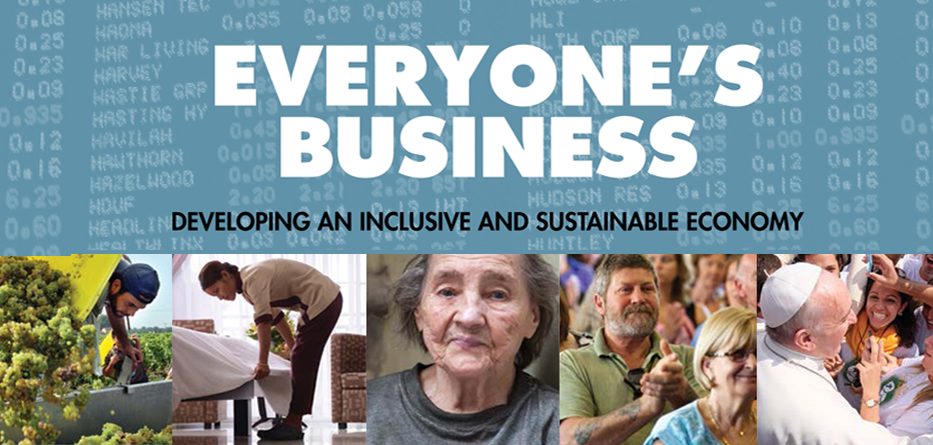On behalf of the Australian Catholic Bishops Conference, I present the 2017–2018 Social Justice Statement, Everyone’s Business: Developing an inclusive and sustainable economy.
This Statement is inspired by the teachings of Jesus and by the unswerving vision of Pope Francis: that the most vulnerable and excluded are the ones who need to take first place in our hearts and in our actions as individuals and as a society. As this Statement makes clear, our Pope draws on Christ’s message of love and ministry to the poor. He also draws on the wisdom of his predecessors, Popes Benedict and John Paul II, and on a tradition that stretches back to Pope Leo XIII in the 19th century.
Another source of inspiration was the major research project that culminated 25 years ago in the 1992 Statement by Australia’s Catholic Bishops, Common Wealth for the Common Good. In that Statement the Bishops warned of growing household poverty and employment insecurity. Most importantly, they stressed that the economy is something that exists not for its own sake but for the benefit of an entire society.
Over the two and a half decades since Common Wealth for the Common Good, Australia has been blessed by a period of uninterrupted growth. We are a far richer nation than we were 25 years ago. Yet there are still too many among us for whom this wealth remains a dream. Hundreds of thousands of people find themselves in poverty even though they have a job. Meanwhile, for those who depend on welfare payments, life has been made far harder.
Our Indigenous sisters and brothers continue to be over-represented in key areas of disadvantage, including life expectancy, illness and imprisonment.
For many Australians, the spectre of homelessness is becoming too real. In major cities and towns the prospect of buying or even renting a home is moving out of reach, even for those with decent jobs. Emerging groups such as older Australians, particularly women, are at risk of becoming homeless.
The ideas behind our Social Justice Statement for this year find strong support among international scholars and policy makers. The United Nations’ Sustainable Development Goals, and the vision of inclusive growth and shared prosperity, reinforce our call for a society in which justice and equity are foundational to the economy, not afterthoughts.
Throughout the Statement runs the theme of Jesus’ parable of the workers in the vineyard, recorded in the Gospel of Matthew. In this passage, all find a place in a fruitful world and are rewarded according to their intrinsic dignity. We pray for the grace to bring this vision about in our own world.
With every blessing
Most Rev Vincent Long Van Nguyen OFM Conv
Bishop of Parramatta
Chairman, Australian Catholic Social Justice Council
Source: ACSJC








